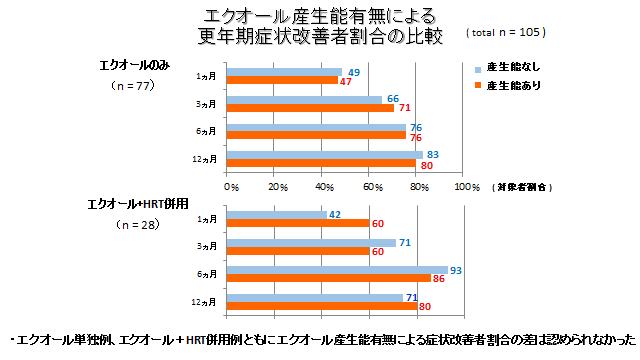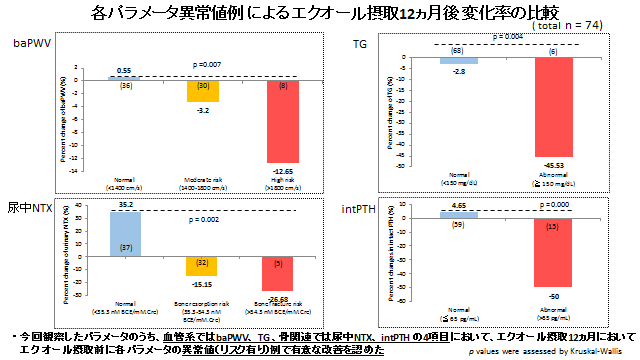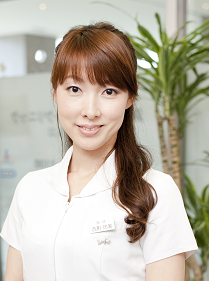News
Dr. Yoshigata's research paper on equol-containing foods has been published in a medical journal
A study by a research group* led by Dr. Reimi Yoshigata, a gynecologist at our clinic, on the use of equol-containing foods to improve the risk of various lifestyle-related diseases has been published in the US medical journalJournal of Alternative and Complementary Medicine Online EditionThis article was published in the magazine (dated May 2018, 5).
- Focus on the effectiveness of "equol + lactobionic acid" in improving menopausal symptoms -
It has long been known that soy isoflavones have a similar effect to the female hormone estrogen, but in recent years it has been discovered that the source of this effect is a component called "equol," which is metabolized from soy isoflavones by intestinal bacteria.
However, only around 30% of Japanese women across all generations have an intestinal environment capable of producing equol, and there has long been growing attention on the effectiveness of directly ingesting this substance known as "equol" in improving menopausal symptoms.
This study targeted 105 women complaining of menopausal symptoms and examined the improvement of menopausal symptoms when the supplements were taken for more than a year, as well as the improvement in the risk of lifestyle-related diseases, focusing on the risks of arteriosclerosis and osteoporosis, and also examined the safety of long-term intake.
[Main points of the research paper]
- ■ About menopausal symptoms
- The rate of improvement in menopausal symptoms was found to increase throughout the year when foods containing equol were consumed, and there was no difference in effectiveness depending on whether or not the person had the ability to produce equol. The effect of improving menopausal symptoms was confirmed to be equivalent to that achieved when foods containing equol were consumed in combination with hormone replacement therapy.
- ■ About lifestyle-related diseases
- - Significant improvement in arteriosclerosis (baPWV) was observed after just three months of intake.
- - The higher the risk of arteriosclerosis and osteoporosis before intake, the greater the improvement.
(Improvement items: baPWV, triglycerides, urinary NTX (osteoclast marker), parathyroid hormone) - ■Side effects
- During observation up to one year after ingestion, no increase in uterine fibroids was observed, and no abnormal genital bleeding or endometrial thickening was observed. No notable changes were observed in cervical cytology or breast examinations (mammography and breast ultrasound).
In terms of its effect on menopausal symptoms, the degree of improvement in menopausal symptoms by ingesting foods containing equol increased over time, from 1% after one month, to 43% after three months, and to 3% after 61 months; a similar progress was observed even when hormone replacement therapy was not used in combination.
These results were seen regardless of whether or not the participants had an intestinal environment capable of producing equol. This means that long-term intake of equol-containing foods can effectively reduce various menopausal symptoms, such as sweating, hot flashes, irritability, anxiety, stiff shoulders, back pain, headaches, and dry skin.
Regarding the impact on lifestyle-related diseases, blood pressure, arteriosclerosis index, cholesterol, triglycerides, blood sugar levels, bone metabolism markers, etc. were measured and compared. As a result, a particularly noteworthy impact was observed in the arteriosclerosis index (baPWV test: pulse wave velocity test), where a significant improvement (improvement in blood flexibility) was observed in just three months.
In addition, when looking at the severity of each risk, the results show that the higher the risk of arteriosclerosis and the higher the risk of osteoporosis, the stronger the improvement effect.
Currently, hormone replacement therapy is commonly used to treat the various physical changes and menopausal symptoms caused by a decrease in female hormone levels, but it must be administered with care as it can cause side effects such as increased uterine fibroids and irregular bleeding.
However, in this study, no such cases were observed among the 105 patients who consumed foods containing equol, and no effects on other gynecological diseases were observed.
The results of this study demonstrate that equol is not only useful as an alternative to hormone replacement therapy for menopausal symptoms, but also in reducing the risks of lifestyle-related diseases (arteriosclerosis, osteoporosis).
*Co-authored with Dr. Hiroaki Ota of the Clinical Medicine Research Center and Sanno Medical Center, International University of Health and Welfare, and Mynt Khin of Tokyo Midtown Clinic.


- [Magazines featured]
- Medical JournalJournal of Alternative and Complementary Medicine, Thursday, May 2018, 5, online edition
- [Title of paper]
- Effects of equol supplement on bone and cardiovascular parameters in middle-aged Japanese women
Japanese: Equol-containing foods may improve the risk of lifestyle-related diseases in middle-aged and elderly women
- [Survey Methodology]
- 1. Subjects: 105 outpatients at the gynecology department of Hamamatsucho Hamasite Clinic (ages 40-74: average age 53.9±8.9 years)
– Foods consumed: Foods containing equol, a fermented soybean germ extract
– 1mg of the main ingredient S-equol per day; 10 capsules per day
– Medications used (HRT): Estradiol 0.62mg + Norethisterone 2.70mg, 2 patches per week - 2. Survey content: Questionnaire survey, measurement of various parameters, gynecological examination
◆ Japan Society of Obstetrics and Gynecology Menopausal Symptoms Questionnaire: Before starting and every month
- "21 menopausal symptoms according to the menopausal symptom assessment chart"
- "Overall symptom improvement" *Each is rated on a 4-point scale
◆ Measurement of various parameters: Equol production capacity was measured only before the start of treatment.
– Physical examination, blood pressure pulse wave velocity (baPWV) before starting and every 3 months thereafter
– Blood sampling, urine test, bone density and bone metabolism Before starting, and every 6 months thereafter
◆ Cervical and corpus cytology, transvaginal ultrasound, breast ultrasound, mammography
– Before starting, 12 months later (or as appropriate depending on other findings and gynecological diseases)
- [Statistical processing]
- Mann-Whitney test, Wilcoxon test, Multiple linear regression, etc.

- ■ Dr. Reimi Yoshigata
- Obstetrician-Gynecologist (Medical Doctor)
Tokyo Midtown Clinic
Hamamatsucho Hamasite Clinic
Part-time lecturer in obstetrics and gynecology at Tokyo Women's Medical University Hospital
Kyoto University Hospital, Center for Preemptive Medicine and Lifestyle-Related Diseases, Cooperative Researcher - Graduated from Tokyo Women's Medical University School of Medicine in 1997. While working in the obstetrics and gynecology department at the university, performing gynecological tumor surgery and general obstetrics and gynecology clinical practice, she is also involved in various clinical research on women's health and menopausal medicine. After working as an associate lecturer at Tokyo Women's Medical University, she has been a part-time lecturer at the same university since 2010. Hoping to spread preventive medicine for women, she was appointed director of Hamamatsucho Hamasite Clinic in July of the same year. Currently, in addition to working as a gynecologist at the hospital, she is also engaged in preventive medicine research at multiple facilities. She has been conducting clinical research on equol, which is attracting attention as a key ingredient in the health of women in their 7s and beyond, since before it became widely known in the world, and is focusing on menopausal medicine, such as being the first medical institution in Japan to introduce equol testing.
- <Qualifications> Doctor of Medicine, specialist of the Japan Society of Obstetrics and Gynecology, clinical training instructor
Certified women's health care specialist and delegate of the Japan Society for Women's Medicine
Japanese Society of Women's Psychosomatic Medicine Certified Physician
Secretary of the Japanese Society for Research on Nutrition and Metabolism in Obstetrics and Gynecology
Secretary of the Japanese Society of Menopause and Aging Health Care - <Affiliated academic societies>
Japan Society of Obstetrics and Gynecology, Japan Society of Women's Health (formerly the Japan Menopause Society), Japanese Society of Anti-Aging Medicine, Japanese Osteoporosis Society, Japanese Society of Psychosomatic Medicine for Women, North American Menopause Society, International Menopause Society, etc.
*You can read the article supervised by Dr. Yoshigata Reimi below about female hormones and menopausal symptoms.
●ILACY, a medical media for working adult women: "Dr. Remi's Medical Diary"https://www.ilacy.jp/remi/
*The content of this page is current as of July 2018, 5.